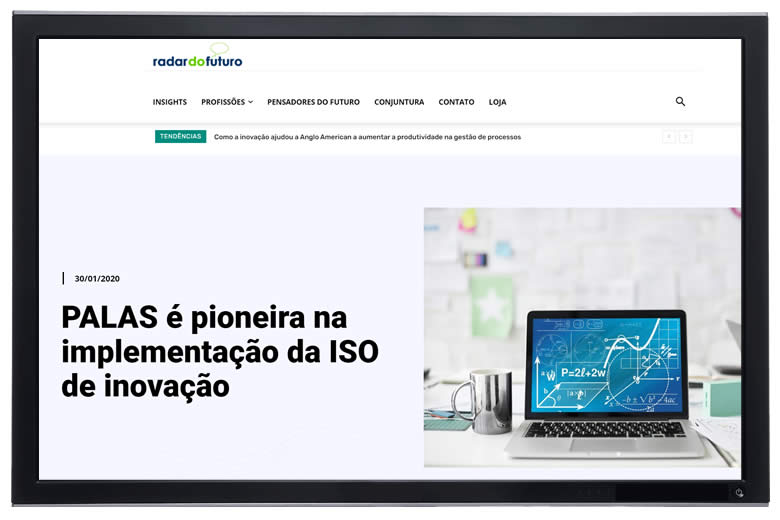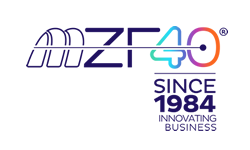PALAS is pioneer in implementing ISO innovation
ISO 56.002 ensures continuous innovation and value creation processes for companies of all sizes and segments.
Innovation is a latent demand nowadays. However, faced with a context of large and rapid transformations coupled with exponential technologies, companies feel completely lost on how to keep their business attractive and profitable in such a volatile environment. Therefore, ISO 56,002, of innovation management, was launched in July 2019, in which PALAS, innovation and management consulting firm, emerged as a pioneer in its formatting and implementation process.
Founded in 1947, with the intention of helping in the reconstruction of companies devastated by the Second World War, ISO – International Organization for Standardization, is a non-profit institution based in Geneva, Switzerland. Anchored on the principles of isonomy (which in Greek means equality), the organization has more than 22 thousand norms that aim to establish worldwide standards for business management. With 164 member countries, ISO has consolidated itself as one of the most important international references when it comes to standardization and management models.
The format
With all this credibility and know-how, in 2008 ISO created an international study group, ISO TC-279, in order to map the best innovation practices of all member countries. Over the years, many countries have actively collaborated, as was the case with France, Canada, Portugal, Russia, Spain, England, and Brazil itself, which contributed with standard ABNT/16.501/2011. Here in Brazil, the knowledge sharing process took place through the ABNT/CEE-130 group, which included Alexandre Pierro, founding partner of PALAS and the person responsible for the Brazilian version of ISO 56.002.
So far, there are seven standards that encompass the innovation management system. ISO 56,000 is the standard that determines vocabularies and fundamentals. ISO 56,002 is the standard that provides the guidelines to implement the management system. “That standard is the key to the family. But, there are still ISO 56.003, which helps the company through the tools and methods of innovation, ISO 56.004, in charge of the assessment. ISO 56.005, which helps in the management of intellectual property generated with innovation, and ISO 56.006, responsible for the guidelines for the management of intellectual property. All of them make up a complete system, which ensures that companies create a management model focused on innovation,” explains Pierro.
The core
Based on eight pillars – process approach, future-focused leadership, insights management, strategic direction, resilience and adaptability, value generation, adaptive culture, and uncertainty management – ISO 56,002 holds that an innovation can be a product, service, process, model, method, or a combination of any of these. However, the concept of innovation is characterized by novelty and value. In short, this means that ideas without the manifestation of value are not innovations but inventions.
The terminology of the main standard with the number two is an indication that it is a standard of guidelines and not of requirements. In other words, it points paths, but understands that there is no single recipe for all companies. “Innovation is a very broad, vast, and complex field of study. ISO understood that what works in one company may not work in another. Therefore, besides deeply understanding all these norms, the professionals involved in the implementation process must have a deep knowledge of innovation methodologies and tools to achieve really effective results”, defends PALAS’ founding partner.
The case
In the same week that the standard was officially published, in July 2019, PALAS implemented the standard in the first industry in Latin America. Our country was among the first three to achieve certification, alongside China and England. MZF4, a nylon processing industry located in the capital city of São Paulo, went through the implementation process while still in the draft version of the standard and earned this prominent place. “It was a very positive and gratifying process for the whole team involved. So much so that the results are already starting to show. The products created during 2019 alone already represent 9% of the company’s total revenue,” is proud of Fabrício Saad, MZF4’s marketing director.
Among the benefits expected from the implementation of ISO 56.002 are the involvement of all stakeholders in innovation projects, the continuous generation of ideas, the creation of a culture of innovation, in addition to the development of new products and even markets not explored by a company until then. “In addition to becoming a reference in innovation, the greatest advantage of the process of implementing this standard is to transform ideas into results. Unfortunately, we see many companies generating great ideas, but that, for lack of processes, end up never leaving the post-its. With ISO 56.002, ideas are taken seriously. We put creativity on the invoice,” emphasizes Pierro.
The process
The certification process is simpler than it seems. ISO 56,002 can be implemented in companies of all sizes and segments. It is possible to implement it in a single department or in the company as a whole. There are even cases of implementation in several units at the same time, even in different countries, in the case of multinationals. The first step is to perform an assessment, which evaluates the level of adherence of a company in relation to the pillars of the standard. After that, the implementation process begins, which takes six to eight months, depending on the level of complexity and maturity of the company in relation to the theme. When the management system is ready, a certifier performs the certification audit, which, if approved, issues the ISO 56,002 certificate of compliance.
Several companies in Brazil and worldwide have already certified or are in the process of implementation Among them is AirBus, an aerospace company that released its certification in December 2019. The market outlook for this certification is great. “Many experts believe that innovation is becoming what quality was in the 1980s and 1990s. To stay active and profitable today, companies need to innovate, and nothing better than a process structured by an institution as serious and of international reputation as ISO to ensure that innovation happens continuously, fluidly, and efficiently in generating results,” concludes Pierro.

Published in Radar do Futuro website on January 30th, 2020:
radardofuturo.com.br/palas-e-pioneira-na-implementacao-da-iso-de-inovacao


